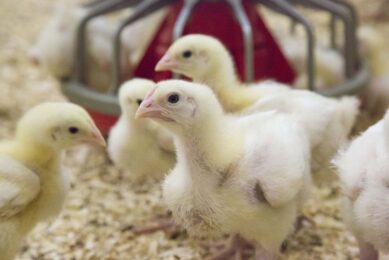Mycotoxins: A major worry for organic poultry

Mycotoxins have many hazardous effects on livestock animals. In poultry production alone, mycotoxins have been linked to mouth lesions, yellow livers, gizzard erosions and poor gut integrity. Many of the world’s biggest poultry integrators pay very close attention to their grain and feed quality because of the effects these challenges may have on poultry health and on profit margins. When it comes to organic poultry production, however, the more stringent regulations also present unique challenges.
First, there is the challenge of supply and demand. According to a survey conducted in 2014 by the USDA National Agricultural Statistics Service, sales of US organic products have increased 72% since 2008. Demand for organic and non-GMO broiler chickens, turkeys and eggs is also strong and is expected to double in the next decade.
Growth in organic poultry sector
In response to the increase in demand, local producers have been expanding their organic and non-GMO production. Organic poultry has had a rapid growth. From 2000 to 2014, organic broiler production grew by 96%, organic layer flocks grew by 89% and turkey production grew by 35%.
Even though the poultry industry has been very quick to respond to consumer demands, the supply of certified organic and non-GMO grains has been slower to react.
Limited supplies of organic corn
The US is the largest corn producer in the world, but in 2011 it was estimated that organic corn represented only 0.26% of production. Today, about 4% of food sales are organic while only 0.5% of US farm acreage is dedicated organic. With a limited supply, buyers are often forced to accept higher levels of broken kernels and imperfections in their grain.
Grains with broken kernels and imperfections usually contain higher levels of moulds and mycotoxins. Most of the mycotoxin-producing species of moulds are soil-born fungi, which can survive and remain in fields for long periods of time. With modern agricultural practices such as no-till methods, incidences of fungal contamination appear to be increasing. The presence of corn stems and infected ears remaining on the soil surface from one year to another may serve as a source of inoculums, contributing to the increased incidence of contaminated grains (Mora and Moreno, 1984). According to Duarte et al. (2008), fungicides can reduce the incidence of Fusarium moulds in corn grain, but the use of fungicides is not allowed when growing organic corn.
Managing a hidden mycotoxin threat
To protect our food chain, the US Food and Drug Administration imposes limits for mycotoxin levels in food and feed. This was highlighted in a recent alert by the National Grain and Feed Association to remind everyone of the acceptable levels. To meet the standards of organic production as well as these limits, organic producers are limited in terms of mycotoxin risk management and gut health prevention tools.
Management strategies and the implementation of a thorough programme are necessary to prevent exposure to mycotoxins. Checking grain quality by utilising industry-approved standards to collect samples and submitting them to a high-standard testing laboratory is a good start, followed by routine maintenance of feed mills to eliminate possible contamination in the milling process. Certified organic mycotoxin control agents in the diets should also be utilised to help prevent or offset the impacts mycotoxins can have on overall performance.
Author: Maunal Reyes, Alltech
To learn more about Alltech’s program for managing mycotoxins, visit www.knowmycotoxins.com.






